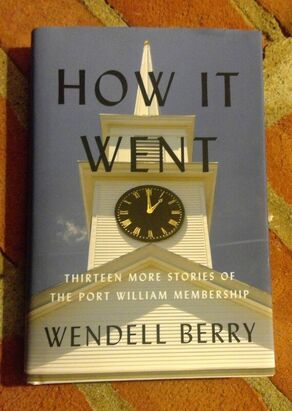 Driving down the road. Putting wet laundry in the dryer. Picking up a garden trowel. The quiet moment before falling asleep. A memory slips into your mind—their familiar whistle, particular look or smell, a phrase spoken…you remember and for a moment you re-member. The Port William Membership…if you don’t know what I’m referring to, it’s time to be introduced to Wendell Berry’s fictional town in Kentucky, its landscape and people. How It Went: Thirteen More Stories of the Port William Membership is his latest (and hopefully not last) book. I bought it for myself for Christmas and quickly read it, but like each of his Port William novels and short stories, they stay with me long after. Berry has a knack for describing the lived experience of the land and its people. Even if their particularities are not your particularities, you find yourself woven into their human experience. Stories of small town & farm-life, a barber and his shop, being a child or a parent during a world at war in the 1940s…they pull you in and draw you like a threaded needle into the fabric of your own life. With an ease that may surprise, you open your own memory box containing the people and places that have made you and many times, held you together. This particular book centers on an old man, a writer, looking back (like Berry himself). “Memories of times and places he had forgotten came back to him, reached him at last as if they had been on their way for a long time. He realized how fully and permanently mere glances, touches, passing words, from all his life far back into childhood, had taken place in his heart…” (p. 76). Andy Catlett remembers those no longer living and “yet by their absence his old companions have in a way come closer to him than they were when they were alive. They seem to involve themselves intimately in his life as he goes on living it” (p. 131). He sounds a lot like Saint John Chrysostom in the 4th century: “Those whom we love and lose are no longer where they were before. They are now wherever we are.” There are expressions of wit and wisdom that you have inherited. There are people whose presence, whether still with you in body or not, continue to bring comfort, encouragement, or perhaps curiosity! Pause for a moment:
___________________________ Just now as I finished writing, my son opened a can of sparkling water and the sound of his pouring it over ice took me back to childhood. I’m in 4th grade, pouring a cold glass bottle of Pepsi over ice and running it out to my mom who is push-mowing the front yard. I knew she loved the frothy fizz and wanted her to enjoy it that hot day. Although little fizz was left by the time she stopped and knelt down to drink it, I remember her look of appreciation, her joy in being remembered. To Get Started with Port William, look for these books: Jayber Crow Andy Catlett: Early Travels Hannah Coulter Nathan Coulter A Place in Time: Twenty Stories of the Port William Membership How It Went: Thirteen More Stories of the Port William Membership Kasey Hitt is a co-founder and instructor for Wisdom Tree Collective. She’s been a spiritual director since 2003 and has been reading Wendell Berry novels and poetry for just as long.
You can also find this blog and others from the Membership of Wisdom Tree Collective here. 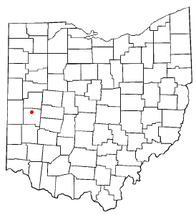 OH county maps by Catbar, the dot is Piqua OH county maps by Catbar, the dot is Piqua “I’ve always known God to be the 'God of Surprises'!” the twinkly-eyed 80-year-old woman said after I asked her to tell me about her relationship with God. “Take you for instance,” she went on, “I woke up in the night a few weeks ago and heard God say, ‘Spiritual direction would be good for you,’ and I said, ‘Yes, Lord, I’m listening, who do you want me to see?’” She paused then said, “And immediately your face came to mind! I remembered you and it didn’t even matter to me that you weren’t Catholic!” I didn’t know her too well and hadn’t seen her since before the pandemic began. In fact, I was amazed she even remembered me at all! “But then you told me you had no openings,” she said incredulously, “So I said, ‘Well, Lord, I’ll trust you anyway.” Her eyes lit up as she said, “And now here you sit!” Three days after I told her I had no openings, I wondered what spiritual director would be able to go see her as she no longer was able to drive. As I thought about who lived close to her, I realized that she lived near the place my daughter took fencing lessons, so I actually did have space in my monthly calendar when I could go see her! We laughed and I said, “God of Surprises for sure!” She told me that while it had been close to a decade since she’d seen a spiritual director, God had always brought the right ones to her at the right time. “Every single one I have connected with and they have become dear to me,” she reflected. Then I asked her where she grew up (it's not a question I usually ask but I did that day). She leaned forward (as to let me in on a secret), “A little town called, Pick-way, O-hi-o!” “You grew up in Piqua, Ohio?!” I said laughing, “Not only do I know where that is, but that’s my hometown, too!” “God of Surprises!” we both exclaimed. We reminisced about Piqua, the streets we lived on and schools we attended. I told her that my parents still lived there and also had a tiny cottage up on Lake Loramie. “Do you know where that is?” I asked her. “Of course! It’s on State Woot 66 and the reason I say "Woot" is because I had a coach for a teacher who had a speech impediment—” I leaped forward in my chair, interrupting her excitedly, “You had Coach Heil!” “What?!” she exclaimed, “You knew him, too?!” “I did because he was my Health teacher AND my Drivers’ Ed instructor! Wow, you had him when he was a young pup in his 20s at Piqua Catholic and I had him when he was in his 60s at Piqua High School!” “God of Surprises!” we gleefully shouted in unison, now both of us suspecting we were part of a Divine secret. We sat in silence for a few moments just marveling, shaking our heads. “I tell you, I would never have guessed in a million years that I would be sitting here in Nashville, Tennessee, talking to you about Piqua, Ohio, and Coach Heil!” I laughed. “I know it, God of Surprises, I told you, it's always been true!" she responded, "I need to call my sister in Ohio because she is never going to believe this!” Believe it or not, there were even more surprising revelations of connection that she shared with me that first session! The hour came to a close and we hugged. I could tell I had already become dear to her and she had become dear to me. There was no doubt the Holy Spirit was the true Spiritual Director! I crawled into my car and couldn't help but cry tears of gratitude all the way back to the fencing club, full of wonder and awe at the God of Surprises. I couldn’t go to sleep. Spending time in a crowded hospital with a dear friend who was dying left me restless and lying awake looking for God in the dark and finding nothing. It was the proverbial last straw. Too much. “What the hell?!...Does God even exist?!” I bitterly thought in the emptiness. The absurdity of being a spiritual director seemed to mock me in that moment. Every image of God I ever held did nothing to comfort me and the absence of images and comfort left me in a place of nihilistic rage and deep sadness. Even though I had read John of the Cross and Julian of Norwich by her hospital bed, recalling conversations we had enjoyed over the years about their (and our) experiences of love in the darkness, here I was struggling in my own dark night. “What a waste of my life! What a charade!” I thought as I recalled my life of being devoted to God and tending to the spiritual life, both mine and others, only to stare into the void of meaninglessness (and not for the first time). Furrowed brow, eyes squeezed shut, the rest of my body now as tense as my face, silently shouting—"Where is God in this chaos?” “Why even ask? Life is showing me there really is no God at all.” After a while, somehow, something small slipped in through the tightness and whispered, “God IS Chaos.” Before I could think, my brow and eyes started softening. My body noticed the truth before my brain could think about refuting what had just been spoken to me in the dark. Then an image appeared in my mind’s eye—Kali. I couldn't remember much about her, only that she's the Hindu goddess of chaos and destruction leading to life. Images of her can be quite disturbing (especially for those of us Westerners who don't know the symbolism) and here she was showing up in the stillness of night! Later I would read that in Hinduism, she is the ultimate manifestation of Shakti, the primordial energy, the mother of all (watch this video for more). Kali’s dark skin stands for this chaotic, life-birthing energy.  "Hearing ‘God IS Chaos’ and remembering the Hindu goddess, Kali…there was something strangely settling in that, and I was able to fall asleep,” I later texted a friend, a nurse experiencing burnout in a crowded hospital (she went on to write a piece of prose for her doctoral class assignment based on our text thread). __________ The next morning, I walked outside in my pajamas. The stifling heat, sticky humidity, and earsplitting cicadas continued the conversation— I was surrounded by the sound and sensations of chaos. I forced myself to sit in the discomfort. From that place I wondered if I had written anything down from the Icon-Writing Retreat my dear friend and I had attended together a couple of months earlier. I went inside, grabbed my journal, then returned to the front porch to find the dates of that weekend retreat. __________ In the first place, I had no time to go on that retreat. Life had been exhausting and the thought of painting anything in that state added to my overwhelm. In the second place, I wanted to spend time with my dear friend, knowing that stage 4 cancer was eventually going to rob us of time (by the way, Kali's name means both "darkness" and " force or fullness of time"). So I picked her up on a Friday morning in May and went. _________ There it was, May 13th-15th, along with a short entry for each day (the last one being, "I am so glad I went."). I was grateful that I had written down a few things, even though they had been forgotten in the rush of life’s challenges. I recalled how my friend and I sat side-by-side looking at the blank wood that our icons would be painted on and while she felt excitement, I felt dread. How was I going to do this?! The instructor told us to fill our brushes with paint and then said, “Relax, because the first stroke when it comes to painting an icon is called The Chaos Stroke!” Immediately I softened and a hint of excitement even found its way inside my weary head. The Chaos Stroke is named so because it represents the primordial energy at the beginning of Creation found in the first chapter of Genesis in the Hebrew Bible. Our spontaneous swirls and waves echoed the Spirit (or Wind or Breath) of God, moving over the surface of the deep, dark waters. And like the Genesis account, step by step, day by day, things started appearing where before there was nothing but potential in the eye of the Beholder. From the chaos within me, from the chaotic swirls on my wooden panel, emerged a rendering of Rublev’s Trinity from the 15th century! 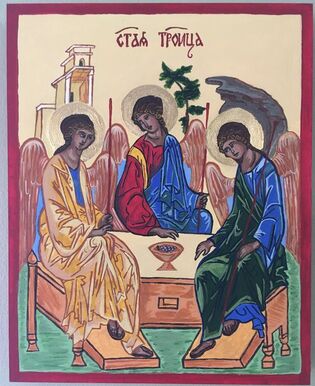 My finished icon of Rublev's Trinity My finished icon of Rublev's Trinity I smiled sitting on the porch, in awe of the synchronicities…chaos, Kali, cicadas, a journal entry about the Chaos Stroke from an icon retreat attended with this friend whose impending death had ushered in another layer of chaos... Nothing had changed. It still felt awful to know my friend was going to die (and she did, less than 24 hours later). And the things that were a mess in my life, were still a mess. Nothing had changed this, and yet… Being open to “God Is Chaos” had strangely allowed comfort and brought the awareness that God was also “With Me in Chaos.” The latter recalls the message gifted us through the person of Jesus the Christ, who was called Emmanuel, God-with-us. Light began shining in my darkness once more. Holding the paradox of "God Is Chaos" and "God With Us in Chaos," I remembered the expression that emerged on the face of the center figure, the Christ, in my friend’s painting of the Holy Trinity—we laughed and called him the “Mischievous Jesus.” He knew something we did not...yet. Even now, words fail to describe how, in darkness and in light, I keep being beckoned into the at-times-difficult, divine dance that Rublev painted years ago, his brush beginning with Chaos. 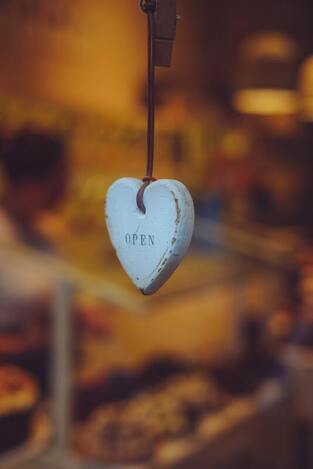 Photo by cyrus gomez on Unsplash Photo by cyrus gomez on Unsplash The comforts of language are true and deep; writes Mary Oliver at the start of “If You Say It Right, It Helps the Heart Bear It” in Evidence. Language is important. Every area of life has its own language whether the world of science or business, music or 12-step groups, the same is true for the world of spiritual direction. One of the first things people notice when coming to spiritual direction is it offers a new kind of language. For those suffering from religious abuse, the language itself can be a balm for the soul. After her first session of spiritual direction, a woman said to me, “The words ‘deep permission’ and ‘invitation’…I’ve just never considered Jesus offering me those, it feels extravagant. But I feel such relief to think that God would be giving me permission and inviting me into something so healing…those words alone have been a revelation today.” No language is perfect, but it helps convey something of essence or experience. Words like hospitality, authenticity, curiosity, allowing, and stirring, offer a different way of entering into a conversation about God and with God. A youth and children’s pastor started using this language of invitation and curiosity during spiritual direction. He has come for a while so has become familiar with thinking about and entering into the spiritual life in some different ways. Hearing him talk warmed my heart, because I knew he was integrating this language of the soul into his work with children and teenagers. As we enter more deeply into these words and find them life-giving, we cannot help but integrate them into our own vocabulary where or when it seems right. However, the irony in all of this, is that spiritual direction isn’t about words at all! We spend a lot of time helping people befriend Silence and the One Who is Beyond All Words. When we and others do speak, the words can be very powerful because they begin with God in Silence. And they can be equally powerful when we do not speak the words, but embody them. I’m reminded of a woman who told me she saw a symbol of another religion in her adult daughter’s home that made her cringe. Usually she would have spoken her mind right away. As she felt her daughter’s eyes on her, she resolved to bring the matter to spiritual direction instead. “Way to go!” I told her, “Way to wait and take it into the Silence with God!” By the end of our session she exclaimed, “Praise God, I’m so glad I didn’t react because it would not have been the right response but one full of fear and judgement. Instead I want to invite her to tell me about it. I want to hear her story.” “And you may learn something really interesting!” I added. Then she asked if there was anything she could read in order to expand her own thinking. After suggesting a book, I said "What a beautiful conversation this is going to be with your daughter! I can't wait to hear about it!" What a wise mother of an adult daughter she is! So words can welcome and invite connection, and words can help us name, describe, and discover even more. But there is no final word—whether it be about God, ourselves, each other, or spiritual direction. We're always growing and expanding...and that’s part of the fun! 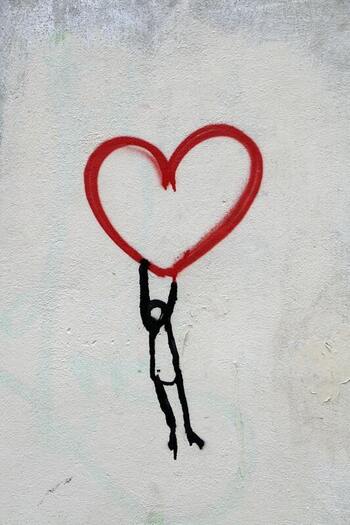 Photo by Nick Fewings on Unsplash Photo by Nick Fewings on Unsplash Living with tension in my chest has been a normal way of life for me for a long while. Feelings of heaviness, anxiety, pressure, and strain are familiar. Usually it is a manageable low-grade variety, but sometimes not. I have dealt with stress in my body for as long as I can remember—from intense stomach issues, headaches, and back pain that began in my early teens through late thirties to chronic hives and tension in my chest that is more prevalent now than the earlier symptoms of the previous decades. What I did not know then that I am beginning to know now is how hard my body has worked in order for me to move through life in productive and even life-giving ways. It has tried to control all the chaos, experienced and perceived, around and within, by holding it in different parts—the head, the stomach, the back, and now the heart. And what does this have to do with Spiritual Direction you might wonder? Well, the spiritual journey is one of giving up control! And that makes a body panic. Authentic spirituality will always lead to surrender and the body is most often the last to let go. Embracing a life of contemplation years ago with its practices of silence, solitude, and stillness has been transformative AND it has led me to this place of being on the brink of a deeper letter go. But first, in teaching me how to be present and not avoid reality, contemplation increased my tension and revealed an inner co-dependency. Weary of the increased tension, I began seeing a somatic therapist (someone who can help me better listen to the wisdom of my body, not just talk about my troubles). She also offers IFS. Internal Family Systems Therapy is a way of working with our internal parts or "family" so that there’s inner harmony rather than polarization and disharmony. I have found it so helpful over the years that I regularly incorporate it into Spiritual Direction with others. So during a session when I turned my attention to my heart, the heart responded with letting me know it was working really hard in “keeping it all together” on behalf of the rest of my body. How?—by consolidating all of the stress and strain into one area, holding it all in the chest…no wonder it felt heavy! As a Reiki Therapist (in addition to being a Spiritual Director), I know that the heart chakra normally filters what is being experienced but my heart was holding it all. Why? It did not want the other parts to feel the pain so it was “taking one for the team.” And the other parts were just fine with this co-dependent relationship. Even if a part was still hurting, it was willingly doing so. This is too common among mothers. Not long ago, I sat across from a mother and wife who has been doing the same thing for her family members. From an outsider’s viewpoint, it can be said that her fun-loving, spirit-lifting self, is the heart of the family. Being sensitive to her family members’ challenges and difficulties, she does her best through a variety of measures to help them not feel pain (or at least not as much), lest in her words, they “be destroyed.” Such a role can drain the light from one’s eyes, while also making it hard to see the co-dependency. Sometimes the only ones who can see clearly are the ones looking from the outside, noticing the absence of the eyes' light. They see the chaos and exhaustion and yet they have the least agency. For no matter how long or often another may see it, true "seeing" must come from within. In the session with my therapist, during a moment of silence, I remembered the painful interaction with my friend a few days before, and my heart said, “What you see in her is me.” Wow! I was surprised and then grateful for this insight. After expressing appreciation for the heroic ways the heart has expressed love for me, the therapist gently reminded this part that it’s easier to pick up a large weight with two hands rather than just one. She went on to say that in allowing other parts to feel the pain and chaos, the burden could be shared. My heart was skeptical but open. It saw and even named the co-dependency itself which meant it was ready for a change. But it still feared that in letting go, I would be destroyed—once again I would experience the searing nerve pain that led to emergency back surgery, the painful IBS that made for uncomfortable moments of dashing toward a restroom, the cancelled plans due to the need to be in a dark room for headache relief, or worse. It wanted to keep me from more of those experiences (and had been doing a pretty good job of doing so!). Yet I had sought help for the tension knowing that true freedom for one does not exist until there is freedom for all, whether in the outer world or inner world. So it began to relax and open in this safe space. And I began to feel the tension spread to my stomach, neck, shoulders, and head…oh no. Gently, I reminded my inner self that I was older now and had insights I did not have earlier in life. We were going to share the burden. And pain did not need to be the enemy. Guess what happened? Instead of being destroyed by the pain, the pain offered wisdom. In being dependent upon the wisdom of the heart, the other parts were sheltered. While this was okay for the short-term, it was unhealthy as a long-term strategy. Yes, different parts of me were not experiencing as much pain, but they were also not aware of the depth of their own strength and agency. “Kasey, when you feel your neck and shoulders get tense, it’s time to take a step back. You’re carrying too much on your shoulders,” the pain in those areas told me. Sometimes we need to step into what we fear may destroy us (or those we love, which is what we fear would destroy us). A spiritual director or therapist is often a wise (and usually a necessary) companion. Sometimes when we take that step, the tension increases. Looking back, the increased tension, even hitting "rock bottom”, is most often what leads to being given new eyes to see. Those new eyes to see help us navigate a new way to be. Next week: “How teaching on contemplative prayer actually encouraged inner co-dependency”  My son mentioned Dylan Carlson, as an example of a baseball player who is confident without being arrogant. Photo by Brian Greene, www.flickr.com/photos/begreen90/32823185058/ My son mentioned Dylan Carlson, as an example of a baseball player who is confident without being arrogant. Photo by Brian Greene, www.flickr.com/photos/begreen90/32823185058/ What happens if you simply can’t receive the gift that’s being offered to you? During a guided prayer with my kids, I had them imagine being a follower of John the Baptist when Jesus shows up on the scene. Out of curiosity and heeding John’s words that this is the One who is mightier than he, baptizing and gifting people with the Holy Spirit, they follow. Then Jesus turns and makes eye contact and asks, “What do you want? What is your heart’s desire?” We paused in silence. Then we took a moment to share our answers. "I don't know," said my 5th grader, "It's hard for me to think if it's a want or a need." "Okay, consider what your heart's biggest need or desire is for this week," I replied. Interestingly enough, my kids both answered the same, “Confidence.” They went on to share stories of where they felt a lack of confidence, especially with the start of school. I had them close their eyes again and imagine answering Jesus, asking him for confidence and allowing him to respond. My 10th grader shared how Jesus’ response was, “It’s a process.” She let the scene unfold and replied to him, “I don’t want to have to try hard to be confident, it’s exhausting.” Answered Jesus, “Maybe trying hard is the problem.” This made her smile. She was curious as to what it might look like to not try so hard to be confident but simply allow the confidence already in her to be, to surface. My son said, “I couldn’t receive it.” I asked him to say a little more. “I couldn’t take it in, I just couldn’t.” When asked why, he had no idea. However, when asked, “What is part of you afraid will happen if you receive it?” (Remember, another part of him wanted and desired confidence.) He responded, “If I take it in, I’m afraid I’ll take too much.” This part had a fear that being confident would make him arrogant. It helped to discuss the difference between the two by thinking of baseball players who exude confidence without arrogance. We went onto acknowledge that sometimes we have no control over how others perceive us. Sometimes we have to let them think what they’re going to think. Unfortunately some may see arrogance where there is simply confidence. What matters is what is in our hearts. Once again, the words spoken to my children by Jesus, spoke to me. Perhaps they speak to you, too. How would you answer Jesus’ question? Now close your eyes and imagine Jesus’ response (but don’t try too hard!). Perhaps the gift you are looking for is already within you! Or if you find yourself struggling to receive the gift being offered, you just might ask, “What is part of me afraid will happen if I receive it?”  Photo by Jess @ Harper Sunday on Unsplash Photo by Jess @ Harper Sunday on Unsplash It’s what the old Shaker song says, at least! In fact, some lyrics say 'tis "the” rather than “a” gift to be simple. But nothing seems simple anymore. We live in a world of information (and misinformation!) at our fingertips. We're bombarded by choice at the grocery store and online. Constant comparison is exacerbated through social media. And stores like HomeGoods, Tuesday Morning, Ross, Overstock.com, Lowe's, Home Depot, and others are happy to feed our "more and better" obsession. "Complex" is more apt to describe our times rather than "simple." This is not necessarily a bad thing, it may be important to look at the complexities at work under the surface, rather than oversimplify an issue or situation (or even a person or group of people!). So in our cultural context, what is the gift of simplicity? And if we do discover it to be a gift, how do we go about receiving it? I began to return to simplicity in my blog last week, but I want to explore this question over the next few weeks as I glean from others' insights and experiences. Maybe you have some wisdom to share with me as well (my daughter sure did)! On a walk with my young teen earlier this week, I asked her, “What is the difference between simplicity and settling?” “I think it has to do with what changes,” she replied. She went on, “There can be all kinds of changes on the outside. But when a person settles, there’s no change on the inside.” “So for you, simplicity is a gift or practice that changes us…how interesting! And, would you say that simplicity helps us deal with the changes on the outside of us?” “Yes, I mean, that makes sense to me.” “What a good perspective! I’m going to be thinking about simplicity and change for a while.” _________________________________ What does the dance between simplicity & change offer you? I am invited to continue exploring simplicity as both a gift and a practice that offers deep change—peace and inner transformation. Simplicity may change me by changing the way I view “all the things.” Perhaps it gives the gift of discerning eyes when faced with a storm of choice and change!  Imagine you are being photographed and interviewed for Humans of New York. What story do you tell? “We are the stories we tell about ourselves,” proclaims Rabbi Rami in his Guide to Forgiveness (p 65). If this is true (and our love of stories, as evidenced by the popularity of Humans of New York along with Netflix and novels, show it is), then it’s important that we know what stories we’re telling. If the stories you share with others and the stories that live in you were turned into a movie, a series, a novel, or a HONY Facebook post, I’m curious what they would reveal as to who you are (at least in your own mind or who you want people to believe you are!). It’s worth consideration, so let’s ask some questions: If you were to share 3 life-defining stories, what stories would you tell? When you start thinking through your stories, maybe you discover there are more you want to tell, so try 7-12 stories. Maybe you write down the titles or a brief synopsis to begin with, then take a look at them. Notice how your collection of stories define who you are and how you approach and move through life. How many of your stories include tragedy and/or suffering? How many of those stories also include redemption and/or resurrection? Notice any elements of surprise or suspense. Who are you in the stories you tell? What role do you play? Are you cast as the victim? savior? hero? rebel? fool? Is your soul happy with that role? We may not realize that we are playing a role someone else has written for us. Or, we might discover we are typecast in a particularly unfavorable role. Thinking of stories of harm, hurt, anger, and resentment that continue to burden you… Are there any stories that need to be edited or re-storied? Which ones are crying out for a rewrite? Even as strong feelings exist around them… Is it time to assign new meaning or step out of a role that no longer fits? As Rabbi Rami reminds us--feelings come and go, stories can last a lifetime. (p. 79). We do not have to wait until our feelings are all resolved before we move forward with our life. Sometimes feelings resolve as we move forward with more wisdom and creativity than before. Your stories matter. Are you beginning to see how that is true? The story that lives in you shapes who you believe yourself to be (as well as who you believe God and others to be). It also shapes the way you tell stories about yourself to others. Says Gertrud Mueller Nelson, in Here All Dwell Free, “Know your story, or your story will live you.” If we don't know the story we are living, we can easily get caught up in or be entrapped by our feelings of resentment, bitterness, and anger. They can define us by becoming the soil out of which our story grows. Misunderstanding, hurt, harm, suffering...they are all a part of life. Everyone’s story includes them. But not everyone allows them to be transformed. Maybe it’s time to revisit your stories or to write down the names of people in those stories who have caused you harm. Then consider what God has done and is doing with and through those stories. You might be surprised. A beautiful re-storying is found in the book of Genesis in the story of Joseph and his brothers (a powerful retelling is found in Stephen Mitchell’s book, Joseph and the Way of Forgiveness). After being sold into slavery by his own brothers due to jealousy, years later a famine forces them to seek food in Egypt, where Joseph, who was once a slave, has risen to power and is now in charge of the food supply. He recognizes them, though they don’t recognize him so he plans a creative way for the revelation to occur. His God’s-eye view of his own story allows the present story to unfold with compassion and creativity rather than revenge. Or maybe that is the best kind of revenge! After the surprising reveal, Joseph invites his brothers into God’s larger story of redemption when he tells them, “Even though you intended to do harm to me, God intended it for good” (Genesis 50:20). He does not pretend the harm did not happen, he just transforms the harm. Harm happens and usually people don’t mean to harm you (you’re just in the way of their happiness) but sometimes people do. Either way, you are not condemned to your story of suffering, a new story awaits. Will you join in the ongoing work of the Author of Life in transforming your story? I told a friend the other day that as more political signs go up around me, the angrier I become. Most assuredly I wouldn’t be as angry if they aligned with my own ideology…how telling! My reaction reminds me of the immense draw to live on the level of agreement. Do I agree or disagree? If the latter, criticism comes quickly followed by detaching from the author, politician, doctor, Facebook friend, family member, neighbor…write them off…case closed, act as if everything is fine. But this kind of dissociation never works for me in the long run. It's not case closed. Pretending, ignoring, and stuffing feelings ultimately turns into back pain and headaches which is not loving myself (which then leads to the inability to truly love my neighbor). See last week's post for more on loving oneself. The growing rift, polarization, and lack of neighborliness leads me to ask, “Who is my neighbor?” I can’t help but think of Jesus’ parable of an enemy coming to one’s rescue in a time of need (see The Good Samaritan). Or his words in the famous Sermon on the Mount, “You have heard that it was said, ‘Love your neighbor and hate your enemy.’ But I tell you, love your enemies and pray for those who persecute you…" Matthew 5: 43-44 Ugh. How do you actually do this? Realizing that we see our own reflection in the faces of others—both the shadow and the light—can add to the pressure. The shadow within is hard enough to face, it can be twice as hard when I see it in the face of others (if I’m even willing to admit I do)! Who wants to admit that the narcissism detested in someone else can be a mirror reflecting the narcissism residing within one's self? Note: This doesn’t excuse or downplay the narcissistic actions by the other. When Jesus boldly expanded on his Jewish lineage saying that not only are our neighbors those who belong to our family/group and those on the margins of our family/group, but so are our enemies, it must have stunned his audience. Even though it was consistent with his teachings about the Kingdom of God and his prayer that life on earth reflect life in heaven, we sadistically like the idea of some people not being included. But the love of God includes everyone. Jesus reminds his listeners, right after telling them to love their enemies, that God sends rain for those who do right and those who do wrong. And like the moon reflects the sun, we're to reflect God. So how do we integrate the shadow and light of others, especially that of our enemies? And why should we even try? When it comes to why, enemy-hating takes up a lot of space in our inner world. It crowds out what is life-giving. Jesus knew the fruit that hate bears. It depletes our inner energy and resources, crippling our ability to live a life of Love within and without. “Hatred destroys finally the core of the life of the hater…hatred tends to dry up the springs of creative thought in the life of the hater, so that his resourcefulness becomes completely focused on the negative aspects of his environment.” Whoever we hate holds power over us. When we release the hate, we release their power over us, and free up that energy to love. Hatred, like love, may start out small (one act or one person), but it quickly overflows into everything and everyone.
So again, what are we to do? How can we begin to release criticism, anger, and hate? Since curiosity is helping me release the anger and criticism toward myself, I’ve been experimenting with curiosity in the shift toward loving my neighbor/enemy. What might happen if I chose curiosity over criticism with my "neighbor"? Another political sign went up, this time with a flag on the porch of someone I’ve never met. Going past their residence, I looked at the signage and their house with curiosity:
After a few wonderings & questions (without providing hypothetical answers!), I found my face softening and a willingness to actually have a real conversation rather than a hardening and hiding in my anger. Honestly, I was surprised. I experimented with a friend when the conversation turned to politics and we wanted to criticize a group of people. When we shifted to curiosity, the critique faded. Surprise again! The most recent opportunity happened when someone disagreed with my schooling choice for my kids. I asked some questions instead of focusing on defending myself. They began asking questions. We left the conversation still having differing opinions, but smiling and looking forward to future conversations. Curiosity may be the spiritual practice for this season. May it be a step on the path of peace, a way of wisdom, a beginning in embodying the love of God, especially toward all of those putting up political signs! 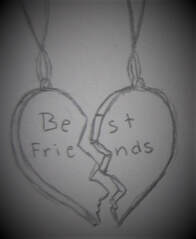 Finding yourself triggered more than usual with thoughts and feelings of rage, resentment, and judgment? I know I am. And it's not just toward others (we'll focus on that next week)! What are we to do with inner voices of critique and judgment, chronic dissatisfaction and frustration? How do we not let ourselves be beat up by them? Is there another way? Jesus once summed up the entire Scriptures by saying, “'Love the Lord your God with all your heart and with all your soul and with all your mind.' This is the first and greatest commandment. And the second is like it: ‘Love your neighbor as yourself.’” (Matthew 22:37-38) “Loving your neighbor as yourself” is to “loving the Lord your God,” as the moon is to the sun. The former reflects the latter. Like the line from his prayer to the Father, “Thy Kingdom come, Thy will be done, on earth as it is in heaven,“ Jesus teaches and prays for wholeness—inner and outer continuity, authenticity, alignment. Oneness with God, self, and neighbor. “Loving yourself” is inextricably linked to “loving your neighbor.” Think of those best friends necklaces with two halves, both are needed to make the heart whole. So let's begin with our part--ourselves. Tell me, how are you loving yourself these days? How would you characterize your inner conversations? Are they best friends necklace worthy? Is your inner landscape characterized by harmony and peace? What/who is your inner world reflecting? Given I resonate with a One on the Enneagram, inner critique and compulsive improvement of myself (& others) along with their counterparts of rage and resentment are easily accessible. They are often lurking, looking to supplant the inner voice of Love. When that happens, I cannot relax so compulsive doing is often the result (and a red flag). Recently, someone brought up a class series I taught a while ago and said that what continues to stick with her most was how I started every class with the invitation to be curious. I usually write these three phrases at the top of the dry erase board or handout: “Be curious. Be compassionate. Be aware” Given the subject matter is designed to go deeper, I know most classes will challenge our surface-level survival self (our ego). In response, people can expect to experience resistance (and all manner of feelings). That's not bad. There's wisdom in the resistance if we look. Given what we're presented with on a daily basis right now, there's plenty of subject matter to challenge our survival selves, isn't there?! At any moment, fear may be triggered, or anxiety, anger, resentment, rage, envy, sadness, guilt, shame, even numbness and avoidance. Instead of harmonious, our inner world begins to look like a daily war zone where there isn't the space or ability to give and receive love since it's all about surviving the day. What can bring peace to the inner chaos? Certainly not more "shoulds"! Fortunately, God offers us paths of peace. One that I've found is choosing curiosity over critique. It almost immediately relaxes inner tension, opening me to the inner voice of Love. Remember, it was Moses’ curiosity that caused him to stop what he was doing and take a closer look at the burning bush. From inside the fire, the Voice of Love spoke to him. Try it. Be curious.
Once becoming aware of the tone, physical sensations, and triggers, then the next time you experience them, rather than continuing down the path of self-condemnation which can lead to inward or outward lashing out, pause. Turn your compassionate gaze toward that inner burning (or numbness) and be curious:
Let's play with this concept of curiosity with ourselves. Next week we'll consider curiosity with others. |
AuthorKasey is a scarf, ball and club juggling spiritual director just outside of Nashville, TN. Play helps her Type-A, Enneagram 1 personality relax, creating space for poetry and other words to emerge. She also likes playing with theological ideas like perichoresis, and all the ways we're invited into this Triune dance. Archives
January 2024
Categories
All
|
By clicking “Sign up for E-News” I consent to the collection and secure storage of this data as described in the Privacy Policy. The information provided on this form will be used to provide me with updates and marketing. I understand that I may modify or delete my data at any time.
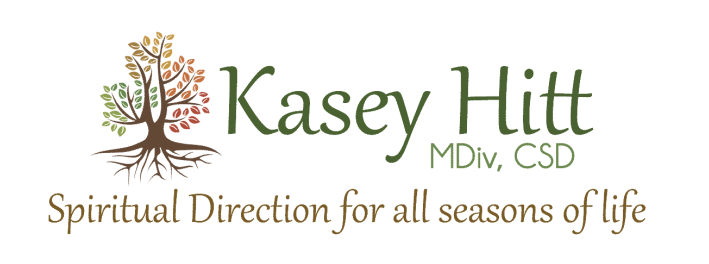

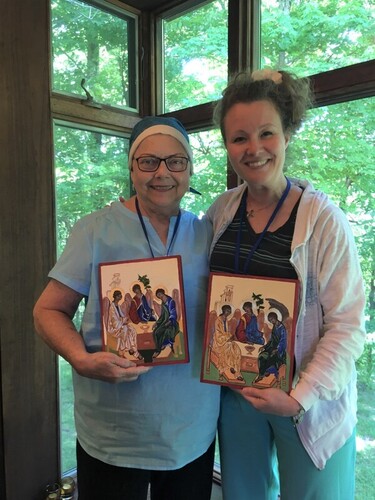
 RSS Feed
RSS Feed

